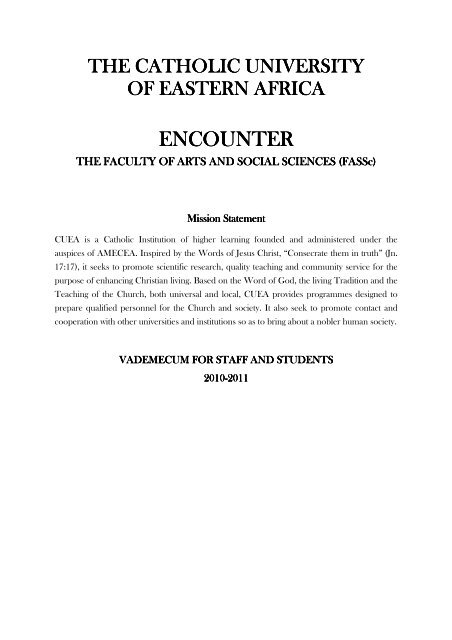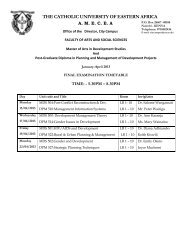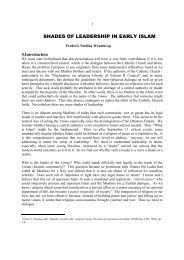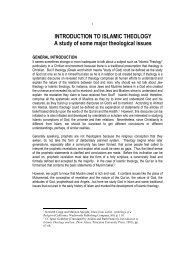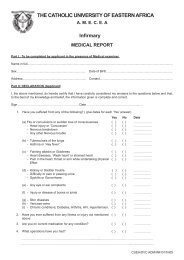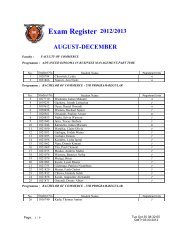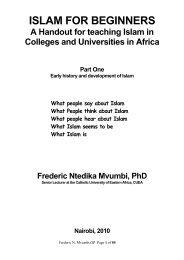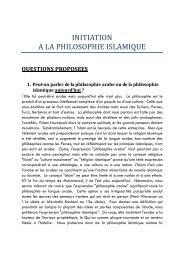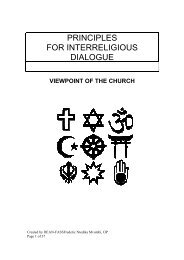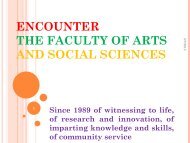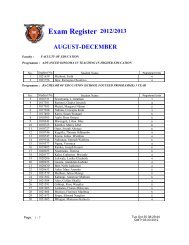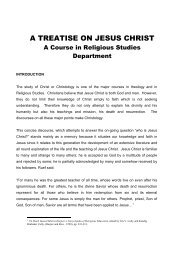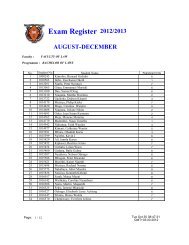FASSC PROFILE.pdf - CUEA
FASSC PROFILE.pdf - CUEA
FASSC PROFILE.pdf - CUEA
You also want an ePaper? Increase the reach of your titles
YUMPU automatically turns print PDFs into web optimized ePapers that Google loves.
THE CATHOLIC UNIVERSITY<br />
OF EASTERN AFRICA<br />
ENCOUNTER<br />
THE FACULTY OF ARTS AND SOCIAL SCIENCES (FASSc<br />
FASSc)<br />
Mission Statement<br />
<strong>CUEA</strong> is a Catholic Institution of higher learning founded and administered under the<br />
auspices of AMECEA. Inspired by the Words of Jesus Christ, “Consecrate them in truth” (Jn.<br />
17:17), it seeks to promote scientific research, quality teaching and community service for the<br />
purpose of enhancing Christian living. Based on the Word of God, the living Tradition and the<br />
Teaching of the Church, both universal and local, <strong>CUEA</strong> provides programmes designed to<br />
prepare qualified personnel for the Church and society. It also seek to promote contact and<br />
cooperation with other universities and institutions so as to bring about a nobler human society.<br />
VADEMECUM FOR STAFF AND STUDENTS<br />
2010-2011<br />
2011
“CONSECRATE THEM IN THE TRUTH<br />
UTH” (JOHN 17:17)<br />
Chancellor<br />
Pro-Chancellor<br />
Vice Chancellor<br />
DVC Academic<br />
DVC Administration<br />
DVC Finance<br />
University Registrar<br />
University Librarian<br />
University Chaplain<br />
Dean of Students<br />
University Governance<br />
Most Rev. Tarcisius ZIYAYE<br />
H.E John Cardinal NJUE<br />
Rev. Prof. John C. MAVIIRI<br />
Dr. Justus MBAE<br />
Rev. Prof. Juvenalis BAITU<br />
Dr. Ocbamarian BEKIT<br />
Mr. Alex KAMWARIA<br />
Rev. Fr. Maurice KISENYI<br />
Rev. Fr. Joseph MUKUI<br />
Dr. Magdalene N. DIMBA<br />
Dean of Theology<br />
Dean, FASSc<br />
Dean of Education<br />
Dean of Commerce<br />
Dean of Law<br />
Dean of Science<br />
Director, Center for Social S<br />
Justice and Ethics<br />
Other Administrative Staff<br />
Rev. Prof. Clement MAJAWA<br />
Rev. Dr. Frederick MVUMBI<br />
Dr. Amanuel TEKLEMARIAM<br />
Dr. Aloys AYAKO<br />
Mr. Emillius NDERITU<br />
Dr. Genevieve MWAYULI<br />
Sr. Elizabeth NDUKU, PhD<br />
Coordinator, School Focused<br />
Programme<br />
me<br />
Dr. Githui KIMAMO<br />
Coordinator of Evening<br />
Programme<br />
me<br />
Dr. Abel KINOTI<br />
Compiled by:<br />
Frederic N. Mvumbi, Bernard Ndonga, Anne M. Karanja, John K. Muteti, Simon P. Otieno, Vincent<br />
Gaitho, Samuel A. Nyanchoga, Bernard M. Kadurenge, John Muhenda, Sylvia Atoko.
Faculty Administration<br />
Dean:<br />
HoD English<br />
Rev. Dr. Frederic N. MVUMBI (deanfassc@cuea.edu, fmvumbi@cuea.edu,<br />
mutubatu@yahoo.com)<br />
Dr. Simon P. OTIENO<br />
HoD Development Studies<br />
HoD Geography & Environmental Studies<br />
HoD History<br />
HoD Kiswahili<br />
HoD Philosophy<br />
HoD Religious Studies<br />
HoD Social Sciences<br />
Secretary to Dean (Tzadua)<br />
Secretarial Pool (Nsubuga)<br />
Dr. John K. MUTETI<br />
Mr. Vincent GAITHO<br />
Prof. Samuel NYANCHOGA<br />
Mr. Bernard KADURENGE<br />
Rev. Dr. John MUHENDA<br />
Rev. Dr. Frederic N. MVUMBI<br />
Mr. Bernard NDONGA<br />
Ms. Sylvia ATOKO<br />
Ms. Caroline, Ms. Pauline, Ms. Kezia,<br />
Ms. Rosemary<br />
Departmental Offices<br />
1. English (Rugambwa Hall)<br />
2. Developmental Studies (Otunga Hall)<br />
3. Geography and Environmental Studies (Tzadua Hall)<br />
4. History (Tzadua Hall)<br />
5. Kiswahili (Tzadua Hall)<br />
6. Philosophy (Nsubuga Hall)<br />
7. Religious Studies (Otunga Hall)<br />
8. Social Sciences (Tzadua Hall)
Teaching Staff<br />
(Full-Time and Part-Time and Major Units)<br />
1. Department of English<br />
Full-time Lecturers<br />
Sr. Lucy Nabukonde<br />
GS 101: Communication Skills<br />
Ms. Alice Kiai<br />
ENG 200: Origins and Development of English<br />
ENG 302: Second language Learning<br />
Mr. Peter Mbugua<br />
ENG 102: Introduction to the Structure of English<br />
ENG 201: Morphology and English Syntax<br />
ENG 403: English Structure and Semantics<br />
ENG 301: English Grammar & Usage<br />
ENG 402: Advanced Theoretical Syntax<br />
Dr. Michael Oyoo<br />
LIT 100: Critical Reading and Response<br />
LIT 202: Literature & Contemporary Writing<br />
LIT 206: World Literature<br />
LIT 301: Theory of Children’s Literature<br />
LIT 302: Theory and History of Literature<br />
LIT 403: Modern European Literature<br />
LIT 400: Literary Aesthetics<br />
Dr. Simon Peter Otieno<br />
LIT 106: African Oral Literature<br />
LIT 205: Theatre Arts<br />
LIT 402: Drama in Education<br />
LIT 314: Creative Writing
Mrs. Selline Oketch<br />
LIT 203: Literary Language and Scholarly Presentation<br />
LIT 401: African Literature<br />
Part-time time Lecturers<br />
Mr. Basweti<br />
GS 101: Communication Skills<br />
Mr. Ng’ang’a<br />
GS 101: Communication Skills<br />
Mrs. Nyarige<br />
GS 101: Communication Skills<br />
Ms Anna Kula<br />
GS 101: Communication Skills<br />
Mr. Oyoo<br />
GS 101: Communication Skills<br />
Ms. Purity Nthiga<br />
ENG 101: Introduction to the Study of Language<br />
Mr. Geoffrey Maroko<br />
ENG 100: English for Academic Purposes<br />
ENG 300: Research in Language<br />
ENG 303: Discourse Analysis<br />
Ms. Juliana Oswago<br />
ENG 203: Varieties of English<br />
ENG 400: Advanced Level Sociolinguistics<br />
Mr. Peter Ngure<br />
ENG 202: English Phonetics and Phonology<br />
ENG 401: Advanced Theoretical Phonology and Morphology<br />
Dr. John Mugubi<br />
LIT 300: Stylistics and Literary Techniques<br />
2. Department of Development Studies<br />
Full Time Lecturers<br />
Dr. John Muteti<br />
SDS 206: Introduction to Macro Economics
SDS 102: Introduction to Micro Economics<br />
DPM 519: Principles of Economics<br />
DPM 529: Project Planning & Management<br />
Cornelia M. Liku<br />
DPM 527: Strategic Planning Techniques<br />
SDS 107: Introduction to Millennium Development Goals<br />
SDS 210: Gender Considerations in Development<br />
DPM 530: NGOs and Development<br />
Michael Tedd Okuku<br />
SDS 101: Development Principles & Concepts<br />
SDS 203: Development Theory<br />
SDS 207: Social Change & Development<br />
SDS 302: Project Appraisal Techniques<br />
Philip Wandera<br />
DPM 528: Entrepreneurship & Micro Finance (Regular)<br />
SDS 109: Introduction to Project Planning & Management<br />
Research Methods (Regular)<br />
Community Mobilization & Collective Action<br />
Part – Time Lecturers<br />
Mary Wainaina<br />
SDS 311: Statistical Techniques<br />
Elizabeth Kioo<br />
SDS 211: Qualitative & Quantitative Statistics<br />
DPM 528: Entrepreneurship & Micro Finance<br />
Ruto Yano<br />
DPM 510: Management Information Systems<br />
SDS 108: Introduction to Management Information Systems<br />
Moses Injendi<br />
DPM 503: Research Methodology
Martin Kweyu<br />
DPM 510: Management Information Systems<br />
SDS 205: Computer Applications in Development Work<br />
Rose M. Mutiso<br />
SDS 305: Globalization and Development<br />
George Wakah<br />
SDS 408: Financial Accounting Techniques<br />
Frida Mutui<br />
SDS 202: Geography of Development<br />
Peter Muigai<br />
DPM 531: Development Ethics<br />
Josphat Ayamunda<br />
SDS 216: Legal Issues in Development<br />
Cleophus Muli<br />
SDS 303: Deviations, Crime & Resources Mobilization<br />
Dr. Ann Karanja<br />
SDS 301: Development Theory 1<br />
Himan Beyene<br />
SDS 410: Industrialization and Employment Creation<br />
Nzau Mumo<br />
SDS 103: Democratization and Good Governance<br />
Ferdinand Ingoyi<br />
SDS 313: Human Rights and Common Good<br />
Lydia Kivuva<br />
SDS 204: Community Mobilization and Collective Action
Edna Noosim<br />
SDS 206: Introduction to Macro Economics<br />
3. Department of Geography and Environmental Studies<br />
Full-Time Lecturers<br />
Mr. Vincent G. Gaitho<br />
GEO 211: Quantitative Methods in Geography<br />
GEO 312: Geography of Development<br />
GEO 212: Behavioral Geography<br />
GEO 403: Regional Planning<br />
Dr. Thomas N. Kibutu<br />
GS 104: Environmental Studies<br />
GEO 113: Introduction to Human Geography<br />
GEO 313: Theories of Spatial Processes and Patterns<br />
GEO 311: Research Methods in Geography<br />
GEO 321: Urban Geography<br />
GEO 210: Water and Land Processes in Geography<br />
GEO 213: Geography of Africa<br />
GEO 218: Population Geography<br />
Mr. David M. Gaiti<br />
GS 104: Environmental Studies<br />
Geo 110: Introduction to Physical Geography<br />
GEO 111: Cartography and Map Analysis, Atmosphere and Soil Processes<br />
GEO 112: Environmental Conservation & Management<br />
GEO 412: Geography of Natural Disaster Management<br />
GEO 315: Agricultural Geography<br />
GEO 402: Geography of Arid, Semi-Arid Lands<br />
Part-Time Lecturers<br />
Ms. Frida N. Mutui<br />
GS 104: Environmental Studies<br />
GEO 112: Environmental Conservation and Management<br />
GEO 312: Geography of Development<br />
GEO 212: Behavioral Geography
Dr. George .L. Makokha<br />
GEO 401: Remote Sensing and Aerial Photo Interpretation<br />
GEO 310: Atmosphere and Soil Processes<br />
Mrs. Mary W. Maina<br />
GS 104: Environmental Studies<br />
4. Department of History<br />
Full-Time LecturersL<br />
Prof. Samuel A. Nyanchoga<br />
HST 101: Introduction to African History up to 1884<br />
HST 102: Introduction to African History since 1884<br />
HST 105: Themes in East African History to 1900<br />
HST 106: Themes in East African History since 1900<br />
HST 214: Aspects of Latin American History since 15 th Century<br />
HST 301: Sources of African History<br />
HST 303: African Economic History to 1900<br />
Dr Kennedy Moindi<br />
HST 107: Themes in World history to 1500<br />
HST 108: Themes in World History 1500-1914<br />
HST 211: Themes in World History since 1914<br />
HST: 213: Transformation of East Asia since 1800<br />
HST 319 History of USA before 1876<br />
HST320 History of USA since 1876<br />
Mr. Francis Macharia Muchoki<br />
HST 107: Themes in World History to 1500<br />
HST108: Themes in World History 1500-1914<br />
HST 211: Themes in World History since 1914<br />
HST 201: Government, Constitution and Politics in Kenya
Part-Time<br />
Lecturers<br />
Mr Joel Imbisi<br />
HST209: The Transformation of Europe 1789 – 1871<br />
HST 302: Comparative Studies in Imperialism<br />
Nationalism in Africa and other Third World Countries<br />
Dr Pius W Kakai<br />
HST 401: Methods of Historical Research<br />
HST 402: Philosophy of History<br />
HST 414: Ethnicity and Conflicts in History<br />
Dr. Peter Wafula<br />
HST 406: History of Political Ideas<br />
Mr. Nixon Mwangi<br />
HST 208: History of USSR<br />
HST 319: History of the USA Before 1876<br />
HST320: History of the USA Since 1876<br />
5. Department of Kiswahili<br />
Full-Time Lecturers<br />
Muronga B. Kadurenge<br />
KIS 100: Misingi ya Lugha<br />
KIS 102: Historia na Maendeleo ya Kiswahili<br />
KIS 103: Mbinu za Mawasiliano katika Kiswahili<br />
KIS 201: Kitangulizi cha Nadharia ya Tafsiri<br />
KIS 202: Fonetiki na Fonolojia ya Kiswahili<br />
KIS 300: Mofolojia ya Kiswahili<br />
ED 314: Mbinu za Kufundishia<br />
KIS 400: Isimu Jamii<br />
Arege M. Timothy<br />
KIS 101: Misingi ya Fasihi<br />
KIS 200: Uhakiki wa Fasihi ya Kiswahili
KIS 203: Fasihi Simulizi<br />
KIS 301: Riwaya na Hadithi Fupi ya Kiswahili<br />
KIS 401: Ushairi wa Kiswahili<br />
KIS 402: Tamthilia ya Kiswahili<br />
KIS 403: Nadharia za Uchanganuzi wa Fasihi<br />
Prof. Clara Momanyi<br />
KIS 101: Misingi ya Fasihi<br />
KIS 203: Fasihi Simulizi<br />
KIS 301: Riwaya na Hadithi Fupi ya Kiswahili<br />
KIS 401: Ushairi wa Kiswahili<br />
Part-Time Lecturers<br />
Assumpta K. Matei<br />
KIS 100: Misingi ya Lugha<br />
KIS 101: Misingi ya Fasihi<br />
KIS103: Mbinu za Mawasiliano katika Kiswahili<br />
KIS 202: Fonetiki na Fonolojia ya Kiswahili<br />
KIS 203: Fasihi Simulizi<br />
KIS 300: Mofolojia ya Kiswahili<br />
KIS 302: Sintaksia na Semantiki<br />
KIS 301: Riwaya na Hadithi Fupi ya Kiswahili<br />
KIS 400: Isimu Jamii<br />
KIS 401: Ushairi wa Kiswahili<br />
Omondi Osano<br />
KIS 100: Misingi ya Lugha<br />
KIS 102: Historia na Maendeleo ya Kiswahili<br />
KIS 103: Mbinu za Mawasiliano katika Kiswahili<br />
KIS 201: Kitangulizi cha Nadharia ya Tafsiri<br />
6. Department of Philosophy<br />
Full – Time Lecturers<br />
George Ndemo<br />
B-Phl 101: Introduction to Philosophy<br />
B-Phl 102: Logic
B-Phl 103: Critical Thinking<br />
B-Phl 104-1: Pre-Socratic Philosophy<br />
B-Phl 104-2: Classical Greek Philosophy<br />
B-Phl 202-1: Patristic Philosophy<br />
B-Phl 202-2: Scholastic Philosophy<br />
B-Phl 204: Symbolic Logic<br />
B-Phl 302-1: Renaissance Philosophy<br />
B-Phl 302-2: Classic Modern Philosophy<br />
B-Phl 401: Philosophy of Education<br />
SB-Phl 403: African Social Political Philosophy<br />
B-Phl 404: Philosophy of Religion<br />
SB-Phl 003: Socrates an Experiment in Research<br />
SB-Phl 004: Readings in Ancient Greek Philosophy<br />
SB-Phl 005: Reading in Christian Philosophy<br />
SB-Phl 006: Readings in Modern Philosophy<br />
Francis Kamau<br />
B-Phl 101: Introduction to Philosophy<br />
B-Phl 404: Philosophy of Religion<br />
B-Phl 307: Philosophy of God<br />
B-Phl 302-2: Modern Philosophy<br />
SB-Phil.006: Readings in Modern Philosophy<br />
B-Phl 201: Rational Psychology<br />
B-Phl 100: Methods of Doing Philosophy<br />
B-Phl 302-1: Renaissance Philosophy<br />
Rev. Dr. Muhenda<br />
B-Phl 301: Epistemology<br />
B-Phl 305: Ontology<br />
B-Phl 403: African Social & Political Philosophy<br />
B-Phl 101: Introduction to Philosophy<br />
M-Phl 522: History of Ethics<br />
M-Phl 538: Negritude<br />
M-Phl 537: Trends in African Philosophy<br />
M-Phl 536: African Political Philosophy<br />
M-Phl 503: Theories of Ethics<br />
SM-Phl 603: Atheism: Its Roots and Challenges
Dr. Paul M. Shimiyu<br />
M-Phl 512: Metaphysics of Aquinas<br />
SM-Phl 602: Kant - Critique of Pure Reason<br />
M-Phl 500: Methods of Doing Philosophy<br />
M-Phl 536: Social and Political Philosophy in Africa<br />
B-Phl 104-1: Pre-Socratic Philosophy<br />
B-Phl 104-2: Classical Greek Philosophy<br />
SD-Phl 700: Research I<br />
M-Phl 513: Starting Points of Metaphysics<br />
B-Phl 104-2: Classical Greek Philosophy<br />
B-Phl 308: Oriental Philosophy<br />
SD-Phl 731: Issues in Contemporary Africa Philosophy<br />
Dr. Opiyo Anthony<br />
SM-Phl 605: Democracy & Human Rights<br />
EM-Phl 526: Rationalism<br />
MRS 518: Philosophy of Religion<br />
SM-Phl 604: Wittgenstein’s Tractatus Logic Philosophicus<br />
EM- Phl 528: Analytic Philosophy<br />
M-Phl 514: Aristotle’s Natural Theology<br />
B-Phl 405: Philosophy of Language<br />
B-Phl 207: General Ethics<br />
B-Phl 400: Contemporary Philosophy<br />
SB-Phl 007: Readings in Contemporary Philosophy<br />
Dr. David Lutz:<br />
B-Phl 204: Symbolic Logic<br />
B-Phl 207-3: Ethics of Work<br />
M-Phl 503: Symbolic Logic<br />
M-Phl 503: Theories of Ethics<br />
M-Phl 517: Biomedical Ethics<br />
M-Phl 518: Foundation for Ethical Judgments<br />
M-Phl 601: The Nicomachean Ethics of Aristotle<br />
M-Phl 605: Democracy and Human rights<br />
SD-Phl: Formal Logic
Robiel Gebrehiwet<br />
B-Phl 203: Discourse in African Philosophy<br />
B-Phl 403: Philosophy of Education<br />
B-Phl 403: Social and Political Philosophy in Africa<br />
B-Phl 407: Morality and Politics in Africa<br />
DB-Phl 004: Readings in Ancient Greek Philosophy<br />
DB-Phl 008: Readings in African Philosophy<br />
DB-Phl 009: African Philosophy and Oral Tradition<br />
DB 10: African Philosophy<br />
Part-Time<br />
Lecturers<br />
Prof. Nyasani<br />
B-Phl 102: Logic<br />
M-Phl 544: Philosophy of Law<br />
SD-Phl 732: History of African Philosophy in African Philosophy<br />
Fr. Kuria Gershon<br />
B-Phl 301: Epistemology<br />
SB-Phl 004: Readings in Ancient Greek Philosophy<br />
B-Phl 305: Ontology<br />
Eric Ogwora<br />
B-Phl 06: Philosophy of Science<br />
B-Phl 201: Rational Psychology<br />
7. Department of Religious Studies<br />
Full-Time Lecturers<br />
Mr. Maurice Owinyo Adoyo<br />
GS 103: Introduction to the Bible<br />
BRS 106: Introduction to Biblical Literature<br />
BRS 201: Pentateuch<br />
BRS 304: The Gospels<br />
BRS 203: Prophetic Books<br />
BRS 400: Letters of Saint Paul<br />
MRS 508: Methods in Biblical Studies
MRS 509: Synoptic Gospels<br />
MRS 524: Bible in Africa<br />
Dr. Peter Kiarie Njoroge<br />
GS 103: Introduction to the Bible<br />
BRS 205: Phenomenology of Religion<br />
BRS 403: Psychology of Religion<br />
MRS 501: Phenomenology of Religion<br />
MRS 511: Christian Marriage and Sexuality in African Context<br />
Prof. Mary Getui<br />
MRS 515: African Independent Church Movement<br />
MRS 520: Gender and Religion in Africa<br />
DRS 702: African Traditional Religion: Area Studies<br />
Rev. Dr. Frederic N. Mvumbi, OP<br />
BRS 107: Introduction to Islam<br />
BRS 204: Philosophy of Religion<br />
MRS 505: History and Sources of Islam<br />
MRS 506: Islamic Theology<br />
MRS 529: Christianity and Islam in Africa<br />
DRS 708: Interreligious Dialogue<br />
DRS 606: Reformation and Counter Reformation<br />
DRS 503: Studies in the Qur’an, Hadith/Sunna<br />
Dr. Bibiana M. Ngundo<br />
GS 103: Introduction to the Bible<br />
BRS 103: African Culture and Religion<br />
BRS 202: Comparative Religion<br />
BRS 305: Ecumenism<br />
MRS 504: African Traditional Religion<br />
Dr. Lucy Kimaro<br />
GS 103: Introduction to the Bible<br />
BRS 104: Church History<br />
BRS 301: Christology<br />
BRS 402: African Church History
Part-Time Lecturers<br />
Prof. Paul Ogula<br />
DRS 700: Research Methodology<br />
Dr. Kavivya<br />
MRS 503: Rites of Passage<br />
DRS 702: African Traditional Religion (Areas of Study)<br />
Mr. Ferdinand Sakali<br />
BRS 102: Critical Thinking<br />
BRS 204: Philosophy of Religion<br />
BRS 205: Phenomenology of Religion<br />
BRSE305: Religion and Contemporary Issues<br />
Sr. Elizabeth Wangui<br />
GS 103: Introduction to the Bible<br />
Rev. Fr. Mahohoma<br />
GS 103: Introduction to the Bible<br />
Dr. Joseph O. Okumu<br />
MRS 518: Ethical Issues<br />
MRS 518: Philosophy of Religion<br />
MRS 522: Religion and Science<br />
Sr. Katherine K. Misigo<br />
GS 103: Introduction to the Bible<br />
Rev. Dr. Joachim Joseph Msaki<br />
BRS 207: Independent Churches in Africa<br />
BRS 401: Initiation Rites and Christian Sacraments<br />
MRS 510: Models of Churches in Acts and the Major Pauline Epistles
8. Department of Social Sciences<br />
Full – Time Lecturers<br />
Dr. Benson Mulemi<br />
SNT 102: Introduction to Anthropology<br />
SNT 107: Culture and Development Studies<br />
SNT 103: Ethnology of Eastern Africa<br />
SNT 208: Family and Kinship, Material Culture and National Identity<br />
Mr. Gedion Maina<br />
SPO 101: Introduction to Political Science<br />
SPO 345: Introduction to International Law<br />
SPO 446: Diplomacy<br />
SPO 344: International Organizations<br />
SPO 355: Introduction to Administrative Law<br />
SPO 422: Dependency and Development in Third World Countries<br />
SPO 254: Modern Political Theory, Introduction to Political Inquiry<br />
Mr. Mumo Nzau<br />
SPO 351: Comparative Administrative Systems;<br />
SPO 322: Administration of Public Enterprises;<br />
SPO 442: Politics of Regional Cooperation and Conflict;<br />
SPO 231: Introduction to Comparative Politics;<br />
SPO 102: Government and Politics in Pre-independence Africa;<br />
SPO 104: Government and Politics in Post-independence Africa;<br />
SPO 422: Dependency and Development in Third World Countries;<br />
SPO 253: Introduction to Public Administration, Introduction to Political Inquiry<br />
Mr. Moses Injendi<br />
SSO 101: Introduction to Sociology<br />
SSO 401: Sociology of Development<br />
SSO 203: Rural Sociology<br />
SSO 205/SSW 202: Social Change and Development<br />
SCO 104: Fundamentals of Development
Mr. James Kariuki<br />
SSO 106: Introduction to Social Psychology, Economy and Society, Community Development<br />
SS0 306: Gender and Development<br />
SSW 409: Gerontology<br />
SSW 309: Introduction to Social Psychiatry<br />
SSW 408: Economics for Social Development, Social and Development Studies, Community<br />
Organization and Action<br />
Mr. Samuel Wakanyua<br />
SSO 201: Sociology of Deviant Behaviour<br />
SSO 308: Criminology<br />
SSO 313: Urban Sociology<br />
SSW 313: Urbanization<br />
Mr. Urbanus Ndolo<br />
SSO 205: Social Change<br />
SSO 307: Sociology of Marriage and Family, Introduction to Project Planning<br />
SSW 102: Social Work and Social Sciences<br />
SSW 310: Family and Child Welfare<br />
SSW 411: Social Law<br />
Mr. Bernard Ndonga<br />
SSO 206: Basic Research Methods<br />
SSO 301: Advanced Research Methods<br />
SSO 309: Collective Behaviour and Social Movements<br />
SSO 101: Introduction to Sociology<br />
SSW 310: Family and Child Welfare<br />
SSO 104: Socialization Process<br />
SSO 203: Rural Sociology<br />
Dr. Luke Ekisa<br />
SSO 303: Advanced Social Statistics<br />
SSO 310: Demography<br />
SSO 402: Environmental Sociology, Basic Social Statistics<br />
Dr. Anne Karanja<br />
SSO 306: Gender and Development<br />
SSW 403: Counseling
SSW 211: Human Rights and Empowerment<br />
SSW 300: Social Work Theory 1<br />
SSW 300: Social Work Theory 3<br />
SSW 101: Principles and Methods of Social Work<br />
SSW 201: Social Casework and Group Work, Social Capital and Development in Africa<br />
Mr. Allan Korongo<br />
SSO 312: Medical Sociology, Law and Society<br />
SSW 201: Social Casework and Group Work<br />
SSW 200: Social Work Theory 2<br />
SSW 411: Social Law<br />
SSW 410: Health and Community<br />
Prof. Omoka Wanakayi<br />
SSO 412: Sociology of Science, Relief and Development Studies, Basic Social Statistics<br />
Advanced Social Statistics, Social Capital and Development in Africa<br />
Dr. Moses Pundo<br />
SEC 103: Micro-Economics<br />
SEC 403: Applied Micro-economic Analysis, Macro-economics<br />
SEC 101: Introduction for Mathematics for Economists, Advanced Mathematics for<br />
Economists, Advanced Macro-Economic Theory<br />
Ms. Rose Mugiira<br />
SEC 101: Introduction to Economics, Industrial Economics and Environmental Economics<br />
SEC 103: Micro-economics<br />
SEC 105: Macro-economics<br />
SEC 102: Economics of Sub-Saharan Africa, Economics of Money and Banking<br />
Part-Time Lecturers<br />
Dr. Ng’ang’a<br />
SEC 415: Industrial Economics<br />
SEC 401: Introduction to Econometrics<br />
SEC 208: Basic Economic Statistics, Advanced Economic Statistics<br />
Mr. Caleb Opwora<br />
SPO 241: Introduction to International Relations, Politics of Regional Cooperation and<br />
Conflict
Ms. Rose Mutiso<br />
SPO 322: Politics of Industrialization in Africa<br />
SPO 446: Diplomacy, Administration of Rural Development<br />
SPO 221: Introduction to Political Economy<br />
SPO 103: Basic Concepts and Government<br />
Ms. Maristella Moraa<br />
SPO 343: Relations among Developing Countries<br />
SPO 104: Government and Politics in Pre-independence Africa<br />
SPO 451: Administration or Rural Development<br />
SPO 422: Dependency and Development in the Third World<br />
Ms. Tabitha Kubia<br />
SPO 344: International Organizations<br />
Mr. Tom Ocholla<br />
SPO 353: Public Policy Analysis<br />
SPO 355: Introduction to Administrative Law<br />
SPO 351: Comparative Administrative Systems<br />
SPO 453: Administration of Public Enterprises<br />
Ms. Jackline Mbatia<br />
SSO 203: Classical Social Theory<br />
SSO 302: Contemporary Social Theory<br />
Ms. Purity Nduta<br />
Anthropology of Tourism<br />
Mr. Michael Sitawa<br />
Sociology & Political Science<br />
Mr. Joseph Mindo<br />
SNT 405: Culture and Nutrition<br />
SNT 301: Culture and Technology, Economic Anthropology<br />
Mr. Michael Otieno<br />
SPO 201: Introduction to Political Theory<br />
SPO 403: Introduction to Political Inquiry
Mr. Wycliffe Oloo<br />
Legal Anthropology<br />
Mr. Geoffrey Muga<br />
SNT 106: Comparative Ethnography<br />
SNT 102: Introduction to Anthropology<br />
SNT 103: Ethnology of Eastern Africa Societies<br />
Mr. Charles Mugendi<br />
Comparative Economic Systems<br />
Introduction to Econometrics<br />
Mr. Patrick Asango<br />
International Economics<br />
SEC 405: Resources Economics<br />
Dr. Lazarus Ngari<br />
SNT 204: Ecological Anthropology<br />
SNT 209: Theory and Practice in Archeology<br />
Mr. Cleophas Waema<br />
SSW 309: Introduction to Social Psychiatry<br />
SSW 402: Social Psychiatry<br />
SSW 101: Social Work and Social Ethics<br />
SSW 101: Principles and Methods of Social Work<br />
Mr. Tom Nyang’au<br />
SSO 402: Environmental Sociology<br />
SSO 312: Medical Sociology<br />
SSO: 310: Demography, Social And Development Studies<br />
Ms. Elizabeth Kanini<br />
SEC 202: Basic Accounting
PROGRAMMES AND MODES OF DELIVERY<br />
1. Programme<br />
mes<br />
The Faculty of Arts and Social Sciences offers the following programmes:<br />
a) BA Social Sciences<br />
b) BA Development Studies<br />
c) BA Philosophy<br />
d) BA Kiswahili<br />
e) BA History<br />
f) BA English<br />
g) BA Geography<br />
h) BA Religious Studies<br />
i) MA Religious Studies<br />
j) MA Philosophy<br />
k) PhD Religious Studies<br />
l) PhD Philosophy<br />
In addition, the departments of English, Geography, History and Religious Studies are also<br />
cognate departments of the Faculty of Education. This is because they provide the subjects for<br />
the Bachelor of Education School Focused programme.<br />
Note:<br />
The Faculty is in the process of offering the following programs: BA Communication and<br />
Media Studies, BA Kiswahili and Communication, MA Armed Conflict and Refugees, MA<br />
Sociology and Anthropology, MA Economics, MA Political Sciences and International<br />
Relations, MA Social Work, MA Development Studies (Rural and Urban Development), MA<br />
History and MA Kiswahili and Communication.<br />
2. Modes of Delivery<br />
The Faculty of Arts and Social Sciences desires to give equal opportunities to those who have<br />
just completed their secondary education, employees in different Institutions and any person<br />
who meets the admission requirements set out by the University Senate.
The modes of delivery are as follows:<br />
• The Department of Social Sciences and Department of Developmental studies offer classes<br />
to regular Students (from 8:00 am to 5:00 pm) and to Evening Students (from 5:30 pm to<br />
8:30 pm).<br />
• The Department of Religious Studies offers classes to regular students (from 8:00 am to<br />
5:00pm) and the holiday programme students both in the Master’s and Doctoral<br />
programmes.<br />
3. Collaboration and Affiliations<br />
• Trnava University, Slovac Republic, is offering BSc Social Work and Community Health at<br />
<strong>CUEA</strong>.<br />
• The following Colleges are affiliated to <strong>CUEA</strong> through FASSc: Christ the King Major<br />
Seminary (Philosophy, Nyeri), Don Bosco College (Philosophy and Education, Moshi),<br />
Marist International College (Development Studies, Nairobi), Spiritan Missionary Seminary<br />
(Philosophy, Arusha), Tangaza College (Social Ministry in Mission, Social Communication<br />
and Youth Ministry, Nairobi) and Hekima College (Institute of Peace Studies and<br />
International Relations, Nairobi).
MESSAGE FROM THE FACULTY<br />
THE FACULTY SPEAKS, , TEACHES<br />
EACHES, CONGRATULATES,<br />
ENCOURAGES, ADVISES AND WARNS<br />
1. Introduction<br />
The Faculty of Arts and Social Sciences as a Family of God<br />
On behalf of the Faculty of Arts and Social Sciences, I welcome you all –Staff and Students<br />
– and wish you a peaceful, enjoyable and wonderful academic year 2010-2011. Together, we<br />
ask Almighty God to be with us so that we may work and walk together to build our Faculty.<br />
There is need to remind us that our Faculty is united and this unity ought to be visible. This<br />
oneness should be observed in all that we plan, say and do. There should be oneness in vision,<br />
goals and objectives, in the mode of disseminating and receiving information, in schedules,<br />
duties and rights and in social matters.<br />
There is need to remember that we are a great Faculty, a multidisciplinary Faculty, perhaps<br />
the most interdisciplinary Faculty in the University. With 8 Departments (English,<br />
Development Studies, Geography, History, Kiswahili, Philosophy, Religious Studies and Social<br />
Sciences), our faculty should become the most outstanding.<br />
The Faculty must change; it will certainly change for change is inevitable. This change<br />
should come from us and it should be all-embracing; it starts from learning how to live together<br />
as people of the same family. We should bear in mind that studying and teaching are both<br />
forms of learning how to live and be better people. Since we belong to the Catholic University<br />
of Eastern Africa, we are required to demonstrate our commitment to studying and teaching<br />
through our various Departmental and Faculty activities. There should be no observers or<br />
onlookers but active and committed members because we do not leave <strong>CUEA</strong> without shaping<br />
it or being transformed by its mission, philosophy or vision. We should therefore decide to<br />
make our Faculty a family of God! The mission, philosophy and vision of the university<br />
enhance this desire.<br />
The mission of The Catholic University of Eastern Africa is to “promote scientific research,<br />
quality teaching and community service for the purpose of enhancing Christian living.” All<br />
members of the Faculty (Staff and Students), should, therefore, respond to this call and engage<br />
in activities that promote scientific research, quality teaching and community service. These<br />
three elements enhance our Christian life.<br />
<strong>CUEA</strong> is founded on a philosophy that lays great emphasis on free search for the whole<br />
truth about the Creator, Creatures and more particularly human beings. This will certainly help<br />
us find the purpose of our life and add value to it.<br />
The vision of <strong>CUEA</strong> is to be an instrument of liberation and transformation of people.<br />
This transformation is holistic, for it considers all elements of human life.
In order to prepare ourselves – staff and students - for a wonderful academic year and to live<br />
as children of the same family (family of God), to benefit from all academic as well as extraacademic<br />
university programmes, to develop our skills and talents, to increase our knowledge<br />
and our intelligence, to help us balance our views, opinions and beliefs, to create a culture of<br />
life, to learn how to work together, we ought to draw our attention to some important issues<br />
pertaining to our academic, social and spiritual life, not only in campus but wherever we are.<br />
There is need to re-visit our duties and obligations, to meditate on our Catholic identity,<br />
assume our prophetic mission of being true Citizens of The Catholic University of Eastern<br />
Africa, ideal citizens of Africa and a people of God - “You will be able to tell them by their<br />
fruits” (Mt. 7:20).<br />
The Faculty desires comprehensive education – physical, spiritual, moral, intellectual, and<br />
social - by giving them equal consideration. However, the realization of this aspiration goes<br />
through birth and rebirth. We should know that education is not learning. Learning is a process<br />
of acquiring knowledge and skills in a specified domain; education, on the other hand, gives<br />
not only appropriate knowledge and skills but also makes us good and more rational. This is a<br />
call to being happy with God and with our fellow human beings in spite of our differences.<br />
Differences only make sense when they are well understood. It is also a call to be good,<br />
intelligent and social.<br />
The Faculty of Arts and Social Sciences as a Team<br />
The members of the Faculty should live in harmony like team builders. This calls for the<br />
need to enhance our academic collaboration (formally and informally), hence achieve success<br />
in our research initiatives, teachings and publications. We ought to be companions and sources<br />
of blessing to others. The Faculty is therefore setting up structures to enhance this unity.<br />
Partners of the Faculty of Arts and Social Sciences<br />
A quest for intellectual clarity, understanding and teamwork requires profound and<br />
considerate partnership. Partners respect each other and share their concerns as well as their<br />
discoveries. Partnership is the guiding principle of rational appreciation of our differences and<br />
genuine collaboration. Differences are questions that ought to question the questioner. A<br />
question that questions the questioner is more transforming than the one that questions the<br />
object set before it.<br />
2. Academic Life<br />
We begin with academics because we ought to know the reason why we are here as<br />
members of a University or an Institution of higher learning. We are not in a market; we are<br />
not in a farm; we are not in a company or factory; we are not in a supermarket. (These<br />
negations connote some ways of thinking, doing and behaving). There is, therefore, a call to<br />
think, act and behave like people in an Institution of higher learning.<br />
We are here to study and teach. Of course, studying and teaching takes various dimensions<br />
but let all of them be geared towards learning as done in a modern university. As a reminder,<br />
let us know that we are in a Higher Institution of learning (University); staff and students should<br />
therefore keep on learning, so as to rise above street thinking/acting, above inauthentic social<br />
relations, discover ourselves and desire what is desirable. The world is made of negotiable and<br />
non-negotiable things. So, do not negotiate what is not negotiable. For instance, commitment to<br />
our studies and teachings cannot be negotiated, for this is what makes us authentic citizens of<br />
<strong>CUEA</strong>. We need to be educators. Teaching alone does not make education; imparting
knowledge alone is not education. Education is a highly comprehensive word, taking all<br />
dimensions of human life. Such education comes through serious academic activities that<br />
involve the following: knowledge, critical mind and comprehensiveness.<br />
2.1 Staff and Students<br />
2.1.1 Doing what ought to be done<br />
The highest point of our presence in the university is to form our students by equipping<br />
them with knowledge, skills and values that will enable them live, work and transform the<br />
world. Let all academic and non-academic staff be prepared to face this challenge and reflect<br />
on the positive ways of responding to it. Serving our students is the most effective way of<br />
advertizing our university. Moreover, this is the first and most important phase in our<br />
community service and Catholic identity.<br />
On the other hand, students should know that studying justifies their presence in the<br />
university. Therefore, their first primary task is to study, the second is to study, and the third is<br />
to study. With this understanding, all our students should consider studying as their life within<br />
and outside the campus. There is time for everything; this is their time to learn with<br />
intelligence, prudence and curiosity in order to discover new ways of life.<br />
2.1.2 The key to social life: self<br />
elf-knowledge and the knowledge of the other<br />
Do you know yourself? Let us appreciate that life begins with the self and continues with the<br />
other. We should, therefore, spend time in knowing backgrounds, limitations, attitudes,<br />
behaviors, level of understanding and our areas of research.<br />
It is the duty of each student to know his/her lecturers for this is a prerequisite for true<br />
discipleship and fellowship. Thus, a student should get the full names of his/her lecturers, enter<br />
into prudent familiarity with their modes of teaching, their preferences as far as teaching is<br />
concerned and their office hours. The expression “She/he is never in his/her office” should be<br />
discouraged.<br />
Likewise, it is the duty of the lecturers to know their students, for such knowledge shapes,<br />
the pedagogy used in teaching and the type of parenthood that is required to help, particularly<br />
the weak students.<br />
2.2 A Call to Critical<br />
Thinking<br />
The Faculty advises one to think critically because the music of the cosmos, the sound that it<br />
produces, the message that it conveys, the perceptions that it creates and the way it influences<br />
people’s minds could be misleading. They should be subjected to serious questioning. Here,<br />
hidden assumptions, claims, rumors and mere expositions could be accepted or rejected<br />
through a constructive critical process. This helps avoid mere affirmations and vain negations.<br />
We should not affirm or deny something on account of mere saying but on account of its stand<br />
after deep reflection.<br />
So, each unit offered has a purpose; we need to thank all those who designed our<br />
programmes for their brilliant vision. Moreover, each academic/extra-academic activity<br />
proposed by the Faculty/University has a noble function. The Faculty of Arts and Social<br />
Sciences emerged from the need to form and train people in humanities and in Social<br />
Sciences. However, the types and number of subjects offered make our Faculty the most multidisciplinary<br />
in the university. These programmes require critical thinking about the various
aspects of human life and society. A critical mind examines the world with objective eyes.<br />
Here, culture and science are given equal consideration because they are both important for<br />
understanding the human being. Critical mind also promotes scientific study/teaching and<br />
academic research in all fields. Critical thinking flows or ought to flow into all units at all levels<br />
and in all departments. We, therefore, need to create significant space for reasoning so that<br />
reasons for agreeing or disagreeing are made open. Aim to be a critical thinker.<br />
2.3 A Call to Comprehensive<br />
Thinking<br />
It is one thing to think critically and another to think comprehensively. As a matter of fact,<br />
the Faculty offers numerous ways of reflecting on what is: God, people and the universe.<br />
However these three items are looked at through different lenses.<br />
Friends in Social Sciences, Social work, Anthropology, Economics, Political Sciences,<br />
English, Developmental Studies, Geography and Environmental Studies, History, Kiswahili,<br />
Philosophy and Religious Studies will certainly have different views of the same reality. These<br />
different perspectives or these multidisciplinary aspects respond to various goals and objectives<br />
that are needed for a comprehensive knowledge. Differences become a source of wealth when<br />
well understood.<br />
Thus students and lecturers should be inspired by this multidisciplinary state of affairs in<br />
order to broaden our views, think comprehensively, and become multidisciplinary. There is<br />
joy, power and authority to have a large view of things because it helps make sound statements;<br />
generate all-embracing ideas; works for inclusion and paves the way for real globalization.<br />
We should avoid narrow mindedness, for narrow-minded people are like people who are<br />
trained not to see anything else except what they are used to see. They are not able to<br />
accommodate new ideas or opinions or to dialogue. They therefore become enemies of<br />
cooperation and collaboration. We must learn to think comprehensively so as to fit in the<br />
modern world.<br />
2.4 We become what we eat<br />
People who are committed to what they study or teach should be transformed by their<br />
various subjects and be defenders of the substantial values of those subjects. This is a call to<br />
those in Social Sciences to be advocates of the social values that build societies and make them<br />
stronger. Those in Development Studies should be serious agents of integral development that<br />
our society needs. This should narrow down to some specific areas of development such as<br />
Rural and Urban development. Those in Languages (Kiswahili and English) should be vehicles<br />
of our beautiful cultures. Those in Geography and Environmental studies should be promoters<br />
of natural features and guardians of our environment. Those in History should be custodians<br />
of the past for a brighter future. Those in Religious Studies should be rational lovers of<br />
religions for the avoidance of religious conflicts and the promotion of religious values. This<br />
therefore, makes us be what we eat.<br />
2.5 Towards Real<br />
Interdisciplinary<br />
Academic<br />
Activities<br />
The Faculty is highly interdisciplinary but this interdisciplinary is not visible. We must try to<br />
make it visible. The following are a number of suggestions that could help us move into real<br />
interdisciplinary actions.<br />
1. Establishment of a journal for the Faculty that is open to all scholars.<br />
2. Organization of faculty interdisciplinary seminars/workshops that count as units taught (with<br />
marks for our students).
3. Doing joint research projects.<br />
4. Creation of faculty common courses to equip students and lecturers with this<br />
interdisciplinary element (e.g. African Culture and Religion, History of Africa, Introduction<br />
to Political Science/Introduction to Sociology/Economy in sub-Saharan Africa,<br />
Development Principles and Concepts, Environment Conservation and Management,<br />
Introduction to Philosophy and so on).<br />
With this, we shall create an opportunity for all students to have an academic taste of this field<br />
of knowledge, equip them with interdisciplinary minds and help our departments to enhance<br />
academic interactions.<br />
2.6 Other Practical<br />
Norms for Staff and Students<br />
On Courses<br />
For efficiency and order in learning, students are advised to choose courses in an academic<br />
order. This is because there are some courses that must be taught before others. This method<br />
prepares students to study and understand the subsequent ones with ease.<br />
All lecturers and heads of Departments are called to assist and show direction to our<br />
students. It is unprofessional to decline students’ requests on this issue just because the lecturer<br />
ignores the courses on offer. The work of a lecturer is not limited to the classroom. Thus,<br />
lecturers should find time to study and be aware of what is taught in their respective<br />
departments. Departmental academic meetings are meant for sharing of knowledge and<br />
comparing notes. This makes them compulsory.<br />
On Exams<br />
The issue of exams must be taken with special care and consideration. Thus, all staff and<br />
students should be aware of the following points concerning exams: the exam forms as well as<br />
their content, their validity and what they represent in the evaluation process, their implication<br />
to academic growth and their necessity, the setting and marking of exams, recording of marks<br />
and submission to the respective custodians.<br />
On University Calendars<br />
At the end of each year, the University issues calendars for all the main events of the<br />
preceding year: for Regular, Evening, School Focused and Holiday programme students.<br />
These Calendars must be taken seriously by both staff and students for they regulate the major<br />
aspects of university life. For instance, opening dates, exams or submission of marks are well<br />
noted. Note that, whoever does not consider the calendar as a core instrument of university life<br />
may lessen his/her fitness in the university.<br />
2.6. Other academic rights and duties<br />
A responsible person in any organized society is required to know his/her rights and duties<br />
for dialogue, accountability and harmony. Knowing what we must receive and do enhances our<br />
university life (spiritually, academically, physically and socially).<br />
a) Rights<br />
For students<br />
It is your right to have Course Outline<br />
It is your right to know CAT marks before the exams
It is your right to sit for the exams of the units registered and paid for<br />
It is your right to meet with the HoDs and the lecturers for various academic needs<br />
It is your right to have departmental meetings for discussions<br />
It is your right to ask constructive questions and seek clarifications<br />
It is your right to participate in extra-academic activities<br />
For Lecturers<br />
It is your right to get what is necessary for effective teaching<br />
It is your right to know the Faculty/Departments policies, plans…<br />
It is your right to benefit responsibly from the assets of the Department and Faculty<br />
It is your right to be one of the team builders<br />
b) Duties of both students and lecturers<br />
We all have the duty to study and do what is required by the university<br />
We all have the duty to commit ourselves<br />
We all have the duty to respect everyone<br />
We all have the duty to abide by the university’s rules and regulations<br />
We all have the duty to be in harmony with all university units (Department, Accounts office,<br />
Registry, Dean of Students, <strong>CUEA</strong>SO)<br />
We all have the duty to make known our concerns<br />
We all have the duty to familiarize ourselves with the Faculty/Department<br />
3. Social and Spiritual Life<br />
The faculty encourages everyone (Staff and Students) to have a mature, wonderful and<br />
balanced social as well as spiritual life urbi et orbi, that is in the Campus and in “the city”. Such<br />
attitude requires strict discipline that will assist us perceive what should be done and what<br />
should be avoided in our relationship with God and with fellow members of the University.<br />
Like the whole Church which is a companion on the journey towards an authentic international<br />
community” (Cf. Compendium of the Social Doctrine of the Church, p. 236), the Catholic<br />
University is gradually becoming an international community. It effectively builds both our<br />
social and spiritual life. Here, the sacredness of all people is held and education is preserved.<br />
We believe in God and have a great sense of otherness. Hence, our cultures, religions or even<br />
our ideologies should not be a source of division but a basis of unity and cooperation. If we<br />
allow God to guide and direct us, we will have a brave and outstanding social life.<br />
Moreover, the Chaplaincy offers wonderful services that could enhance our moral and<br />
spiritual life. For instance, we can receive baptism and first Communion, be confirmed and<br />
even have sacrament of matrimony (Marriage) in the University. We will certainly be given<br />
appropriate catechesis for all these sacraments. Moreover, the daily masses organized in the<br />
University are for all of us. They act as sources of the grace that we need to be loyal people of<br />
God and humble human beings. Education is about acquiring skills, knowledge and values.<br />
We should, therefore, create more opportunities and avenues to strive for a culture of life and<br />
not a culture of death.<br />
4. Monitoring and Evaluation (Monitoring comes from the Latin verb monere, which<br />
means to warn, to advise, to notify. Evaluation is derived from from the Latin verb valere,<br />
which denotes to value, to assess)<br />
Monitoring and evaluation should not, at any time, be taken as addenda, footnotes or temporal<br />
realities; they are integral parts of any authentic and effective growth.
1. Monitoring: At all times we need, to seek and give advice or guidance on what we do or we<br />
intend to do for better results. Let us compare our opinions with others and see how critical<br />
and comprehensive we are in all that we think and do. We should monitor ourselves and,<br />
at the same time, accept to be monitored by others, for both are not only important but<br />
also necessary for our growth.<br />
2. Evaluation: There should be time for evaluation. This is because the evaluative exercise<br />
inquires whether the value of a particular object (mission statement, studying, teaching,<br />
learning, research, knowledge, skills, and community service) remains intact, has added<br />
value or has lost its value. Without this noble exercise, we will not know whether what we<br />
are still doing is reasonable.<br />
Let us appreciate that the outcome of these two recommendations is incommensurable. They<br />
not only give us a feedback but also a “feed forward”.<br />
5. On the Principle of Subsidiarity<br />
The Faculty seeks to promote the principle of subsidiarity in order to assign power and<br />
make real decisions in all levels of the system. The units that constitute our Faculty (nonacademic<br />
staff, Students, lecturers, Heads of Departments, Departmental boards, and the<br />
Faculty boards) should exercise real power and make noble decision according to their<br />
capacity. This demands genuine knowledge of what we ought to do, to share and supervise on<br />
daily basis.<br />
As a matter of fact, the principle of subsidiarity allows the members of a given unit to own<br />
the unit and display their level of responsibility and commitment. Therefore, everyone should<br />
know the reason as to why he/she is here and act according to his/her job description.<br />
6. The Kind of Leadership we long for<br />
A good leader should be an authority, a companion and a blessing to the society. Max<br />
Weber distinguishes three different types of leadership: rational leadership which relies on the<br />
legal process and a technically skilled bureaucracy, traditional leadership which rests on the<br />
regularized belief in the sanctity of valid traditions, and charismatic leadership which rests on<br />
the extra-ordinary appeal to the holiness or the heroic or exemplary qualities of a person.<br />
(ww.users.surfaid.org/ Leadership.htm)<br />
This scholar is certainly moving towards a particular direction: leadership must be shared<br />
with others for the pursuit of the common good. Sharing is the essence of such conception<br />
because one person cannot possess all the skills or qualities for different situations. Let us know<br />
that it is highly difficult, perhaps impossible, to be good or tactful in all. For instance, a person<br />
may be very good in planning or conceiving prominent ideas but very poor in executing them.<br />
Although one is aware of its various mechanisms, nature, as well as the problems, expectations<br />
and philosophies of leadership, he might not be up to the task as the practice is concerned.<br />
When sharing is ignored or neglected in some prevailing situations, the community faces<br />
conflicts which divide the leader from those he leads. This state of affairs can cause confusion<br />
in the sense that, lacking full knowledge of a given situation, the leader and the people may not<br />
know the kind of leadership to be exercised for a particular good.<br />
Based on this, we can state that a leader must have acute and accurate perceptions of the<br />
needs of the group, the ability to judge and to determine its level of maturity in all dimensions
of human life. Moreover he should have a close and interpersonal relationship with his<br />
followers since he initiates, regulates, informs supports, evaluates, and summarizes. (Cf. Charles<br />
J. Keating, 1978)<br />
Sharing is one thing and the intelligence as well as the ability of the person chosen as a<br />
leader is another, for “if the trumpet gives an uncertain sound, who will prepare himself for the<br />
battle?” If your tongue does not produce intelligible speech, how can anyone know what you<br />
are saying? (1cor.14, 8-9). This is because a leader is there to lead and not to be led, although<br />
leadership concerns both the leader and those who are led.<br />
That we may do what we say and say what we do, we perhaps need a kind of leadership that<br />
will be a symbol of authority, that will centre on companionship and a kind that will be a source<br />
of blessing to all. Moreover, we must be ready to completely reject the opposite as irrelevant,<br />
harmful and dangerous to us and to our following generations. We must continually remove all<br />
fantasies and images by raising the mind to Christ who taught with authority, became a<br />
companion of many and blessed everyone. The following are some reflections on leadership<br />
that could help our Faculty.<br />
The first is that leadership is the symbol of authority. I know that some political trends of<br />
our time have distorted the concept authority. Etymologically, the word “authority” comes from<br />
authoritas which comes from the Latin verb “augere”. And “augere” means to increase. This<br />
means that an authority is the person who increases the physical, moral, intellectual and<br />
spiritual life of the individuals and of the community as a whole. As an authority, a leader feeds<br />
the sheep; he does not feed on them. This demands knowledge of the people and of the<br />
situations.<br />
The second is that, a leader must be a companion (cum pane), the one who share bread<br />
with the community. He, therefore rejoices when someone rejoices and suffers when someone<br />
suffers. He shares his views and listens to the observations of the others. This calls for authentic<br />
love.<br />
The third is that, he is a source of blessings. To bless is to say good things, to wish<br />
prosperity, to work for improvement, to guide and protect. How many times have we witnessed<br />
different people selling their fellow men for irrelevant benefits?<br />
Leadership is service; when given any other meaning; it cannot be true leadership but<br />
something else. Leadership service is what the Faculty of Arts and Social Sciences needs.<br />
AHLAN WA SAALAN<br />
WELCOME
FACULTY LIST OF PROFESSORS AND DOCTORS<br />
A. Professors<br />
1. Prof. Wanakayi K. Omoka<br />
PhD (Sociology), Kent State University, USA<br />
Department of Social Sciences<br />
2. Prof. Mary Getui<br />
PhD (Religious Education), Kenyatta University<br />
Department of Religious Studies<br />
3. Prof. Samuel A. Nyanchoga<br />
PhD (History), Kenyatta University<br />
Department of History<br />
4. Prof. Clara Momanyi<br />
PhD (Kiswahili), Kenyatta University<br />
Department of Kiswahili<br />
B. Doctors<br />
1. Rev. Dr. Frederick N. Mvumbi<br />
PhD (Islamics), University of Ibadan, Nigeria<br />
Department of Religious Studies<br />
2. Dr. Anne Mumbi Karanja<br />
PhD (Development Studies), Institute of Social Studies, Netherlands<br />
Department of Social Sciences<br />
3. Dr. David Lutz<br />
PhD (Moral Philosophy), University of Notre Dame, USA<br />
Department of Philosophy<br />
4. Dr. Paul Shimiyu<br />
PhD (Philosophy), Pontifical Gregorian University Rome<br />
Department of Philosophy<br />
5. Dr. Moses Pundo<br />
PhD (Agricultural Economics), University of Fort Hare S.A.<br />
Department of Social Sciences<br />
6. Dr. Thomas Kibutu<br />
PhD (Geography), University of Leicester, UK<br />
Department of Geography<br />
7. Dr. Bibiana Munini Ngundo (Sr)<br />
PhD (Religious Studies), <strong>CUEA</strong><br />
Department of Religious Studies
8. Dr. Lucy Raphael Kimaro (Sr)<br />
PhD (Religious Studies), <strong>CUEA</strong><br />
Department of Religious Studies<br />
9. Dr. Peter Kiarie Njoroge<br />
PhD (Religious Studies), <strong>CUEA</strong><br />
Department of Religious Studies<br />
10. Dr. Simon Peter V. Otieno<br />
PhD (Theatre Arts and Performance), University of Leeds UK<br />
Department of English<br />
11. Dr. Michael Oyoo Weche<br />
PhD (African Languages and Literature), University of Cape Town, SA<br />
Department of English<br />
12. Dr. Ekisa Luke Anyara<br />
PhD (Social Statistics), University of Southampton, UK<br />
Department of Social Sciences<br />
13. Dr. Benson Mulemi<br />
PhD (Medical Anthropology), University of Amsterdam, Netherlands<br />
Department of Social Sciences<br />
14. Dr. Kennedy Moindi<br />
PhD (History), West Virginia University, USA<br />
Department of History<br />
15. Rev. Dr. John Muhenda (HoD)<br />
PhD (Philosophy), Urbaniana University Rome<br />
Department of Philosophy<br />
16. Dr. Anthony O. Ogutu<br />
PhD (Philosophy), Pontifical Gregorian University Rome<br />
Department of Philosophy<br />
17. Dr. John Kennedy Muteti (H0D)<br />
PhD (Management), NMMU, SA<br />
Department of Development Studies<br />
Be blessed and have a wonderful Academic Year!


